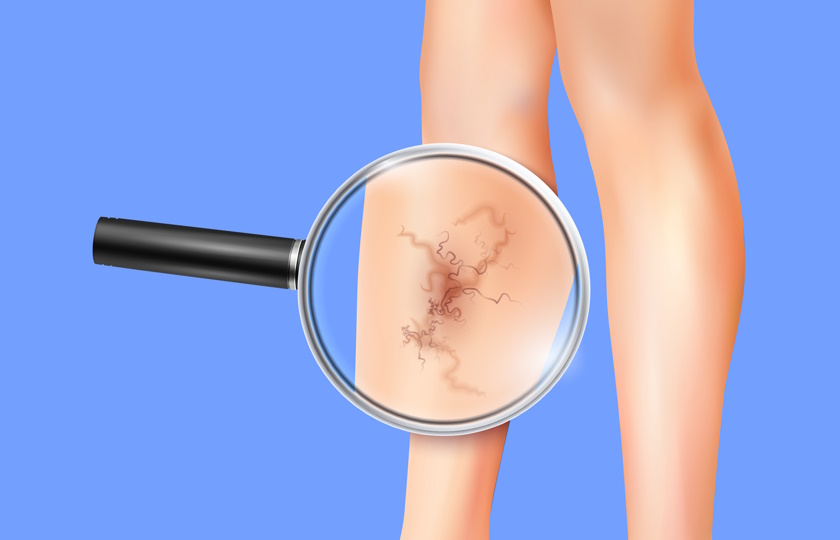
Varicose Veins Complications: How to Prevent and Manage Them
Varicose veins, a common medical condition affecting millions worldwide, can significantly impact quality of life. Although it might initially appear to be a merely cosmetic concern, if left untreated, it can lead to painful complications. In India, this condition is frequently observed among adults, with a significant proportion of patients hailing from Gujarat, where Dr. Sumit Kapadia, a renowned Senior Vascular & Endovascular and Varicose Vein Surgeon, has been providing comprehensive care for vascular diseases, including varicose veins. This blog article will delve into the depths of varicose veins, their complications, and how to manage them effectively.
Causes of Varicose Veins
Varicose veins are a result of weak or damaged vein walls and valves. The veins contain one-way valves to ensure that the blood flows towards the heart. When these valves fail, blood can pool in the veins, leading to enlargement and bulging – what we know as varicose veins.
Various factors contribute to this weakening of the veins and valves. Hormonal changes, as seen in pregnancy, menopause, or with birth control pill use, can lead to varicose veins. Other risk factors include age, family history of varicose veins, obesity, standing or sitting for long periods, wearing tight clothing, and smoking.
Also Read:https://www.drsumitkapadia.com/post/are-varicose-veins-hereditary/
Can Varicose Veins Cause Problems?
While varicose veins are typically harmless and more of a cosmetic concern, in some cases, they can lead to significant complications and health risks if left untreated.
Venous Insufficiency: Over time, the condition that causes varicose veins can lead to chronic venous insufficiency. This happens when the venous wall and/or valves in the leg veins are not working effectively, making it difficult for blood to return to the heart from the legs. This can cause the blood to pool in the legs, leading to symptoms such as swelling, skin changes, and even ulcers or sores.
Venous Ulcers: Varicose veins can lead to long-term skin changes such as discoloration and thickening, especially around the ankles. Over time, these changes can lead to venous ulcers – painful sores that can take weeks or even months to heal.
Superficial Thrombophlebitis: This is a blood clot that forms in a vein just below the surface of the skin. This condition can cause the vein to become red, warm, swollen, and tender to touch.
Deep Vein Thrombosis (DVT): In some cases, varicose veins may increase the risk of developing a more serious condition, deep vein thrombosis. DVT is a blood clot in a deeper vein, often in the legs, which can be life-threatening if the clot travels to the lungs, causing a pulmonary embolism.
Bleeding: The skin over varicose veins can become thin and easily injured. Once an injury occurs, there can be significant blood loss.
Cosmetic Concerns: Beyond these health risks, many people also find varicose veins to be a cosmetic concern, leading to lowered self-esteem and quality of life.
It’s essential to consult with a Varicose Vein Specialist if you are experiencing any symptoms or complications related to varicose veins. Early detection and treatment can significantly reduce the risk of complications.
Complications from Varicose Veins
Varicose veins are not just a cosmetic problem. They can lead to discomforting symptoms such as itching or heaviness in the legs, itching around the vein site, and muscle cramping. Over time, these symptoms can significantly impact an individual’s quality of life.
However, the complications from varicose veins can be even more severe. Prolonged untreated cases can result in skin discolorations and the development of painful ulcers at the site of the varicose veins. Bleeding can also occur if the veins close to the skin’s surface burst.
More critical complications are related to blood clot formation. Patients with varicose veins are at a heightened risk of developing Superficial Thrombophlebitis, a condition where clots form in the veins just beneath the skin. This condition is painful but treatable. However, if a clot forms in a vein deep inside the body, known as Deep Vein Thrombosis (DVT), it can be life-threatening, particularly if the clot travels and lodges in the lung, causing a Pulmonary Embolism.
Complications/side effects of varicose treatment
Although treatments for varicose veins are generally safe, they may sometimes have side effects. Post varicose vein surgery complications may include scarring, skin burns, infection, injury to a nerve, or deep vein thrombosis (a blood clot in a vein deep inside your body). Moreover, new varicose veins can reappear and require treatment.
Sclerotherapy, a procedure where a solution is injected into the vein causing it to scar and fade away, can lead to side effects like redness or bruising at the injection site, brown areas on the skin where the needle touched, or lumps or hardness in the treated vein. Despite these potential complications, it’s essential to note that treatments can significantly reduce symptoms, improve appearance, and prevent further vein problems.
Always consult a vascular surgeon & varicose vein specialist to fully understand the benefits and potential risks of any treatment. It’s important to discuss all possible outcomes and devise a treatment plan that best suits your individual health needs.
Also Read: Top 8 Myths & Facts About Varicose Veins
Varicose Veins Health Risks
While varicose veins themselves do not pose a direct threat to heart health, the underlying vein health might be indicative of broader circulatory issues. Varicose veins signal that the veins’ walls and valves have weakened, impacting their function of blood return to the heart. If this is a widespread issue in the body, it could potentially impact cardiovascular health.
Additionally, severe varicose veins can be a sign of chronic venous insufficiency, a serious condition that affects the veins’ ability to pump blood back to the heart. This disorder can lead to complications like leg swelling, skin changes, and even venous ulcers.
The risk of complications is higher in individuals with specific factors such as advanced age, female gender, family history of varicose veins, sedentary lifestyle, and those who stand or sit for prolonged periods. Moreover, conditions like severe constipation, certain tumors, and tobacco use can also heighten the risk.
Taking the necessary precautions and maintaining good vascular health can mitigate these risks. Regular check-ups with a vascular specialist, like Dr. Sumit Kapadia, can help monitor vein health, guide appropriate lifestyle changes, and provide timely treatment if required. This proactive approach can help prevent potential complications and maintain healthy vascular function.
When should I talk to my doctor about varicose veins?
It’s crucial to talk to your doctor about varicose veins if you are experiencing any discomfort, pain, swelling, or skin discoloration around the affected veins. If the veins are causing you to feel self-conscious or if they itch, ache, or feel heavy, it’s time to seek medical advice. Moreover, if your skin or veins become discolored, painful, red, or warm to the touch, or if you notice any bleeding from the veins, you should immediately consult a varicose vein specialist.
Which doctor to consult for varicose veins?
For varicose veins, it’s advisable to consult a vascular surgeon or varicose vein specialist, who specializes in vein diseases. These professionals have comprehensive knowledge about the venous system and the technical skills to perform procedures and treatments related to varicose veins.
Conclusion
Though complications from varicose veins can be distressing, understanding where varicose veins come from and how to manage them is half the battle. Regular physical activity, maintaining a healthy weight, and avoiding long periods of standing can help prevent the condition from worsening. However, when varicose veins cause discomfort or more severe symptoms, it’s crucial to consult specialists like Dr. Sumit Kapadia. He has years of experience in managing and treating varicose veins, and is equipped with the latest knowledge and techniques to help manage this condition effectively.
Remember, it’s always better to prevent a disease than to treat it. If you have varicose veins, take the necessary steps to manage your condition and seek medical advice to prevent complications.
Follow us on YouTube

MBBS, MS, MRCS, DNB-Fellow
Dr. Sumit Kapadia
Dr. Sumit Kapadia / MR KAPADIA SUMIT a gold-medalist from Baroda Medical College, obtained his general surgical training and senior residency from SSG Hospital, Vadodara.

MBBS, MS, MRCS, DNB-Fellow
Dr. Sumit Kapadia
Dr. Sumit Kapadia / MR KAPADIA SUMIT a gold-medalist from Baroda Medical College, obtained his general surgical training and senior residency from SSG Hospital, Vadodara.




